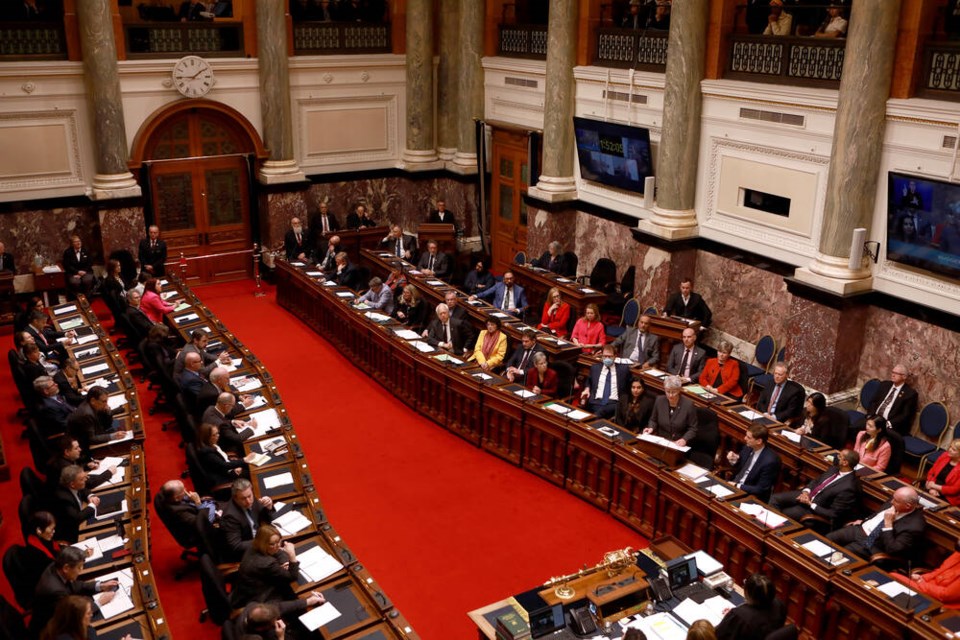You’re spending more money.
“Yes, I know,” you reply while filling your car with $70 worth of gas so that you can drive to the grocery store to buy $80 broccoli.*
(*This assumes you are not a Victorian whose mortgage has just gone up. If you are, you can afford neither fuel nor food, and have been reduced to eating old shoes and slow pets to survive.)
So let’s be more precise: the government is spending more money on your behalf. In a province where any deficit was once treated as a scandal, Tuesday’s budget revealed a spending plan with a series of shortfalls big enough to make Bill Gates swallow his gum. Taxpayer-supported debt will climb from $63.7 billion today to $99.4 billion three years from now.
As it turns out, government is as susceptible to inflationary pressures — the labour shortage, the cost of borrowing — as everyone else. While much of the new spending is aimed at protecting low-income people from the rising cost of living, some of the rise is devoted to just staying in place. Think of Alice in Wonderland, running as fast as she can just to avoid losing ground.
Public sector wage increases have blown past previous projections. The last budget had anticipated that new contracts would push up government spending by $7.6 billion over three years, but that calculation has now doubled to $15 billion.
Capital spending has gone way up, too.
Some of that is due to items being added to the budget, including $224 million for a 306-bed long-term care home to be built in the Royal Bay area of Colwood. (Construction on the latter project, which will also include a hospice, a specialized unit for young people suffering from brain injuries and an adult day program, is scheduled to start in 2025 and finish in 2027.)
Much of the rise in capital budgets, though, comes from ballooning costs for previously announced projects.
For example, the price tag on the new Cowichan District Hospital has gone from $887 million when announced in 2021 to $1.446 billion today.
Ground has yet to be broken on the Royal B.C. Museum’s collections and research building at Royal Bay, but, as Les Leyne reported this week, it has already gone from $177 million to $270 million.
Other Island projects rising in cost:
• The new version of Vic High is now priced at $100 million, up from $80 million.
• The Nanaimo Correctional Centre replacement has risen from $167 million to $181 million.
• A North Island College student housing project has gone from $66 million to $78 million.
Finance Minister Katrine Conroy made it clear Tuesday that it was a priority in this year’s budget to buoy up people threatened by economic pressures. “It’s just not the right time to start making cuts,” she said.
She had a string of measures with that in mind. A long-promised renters’ rebate will appear as an income-tested tax credit, meaning up to $400 a year for 80 per cent of the one-third of British Columbians who rent. The ceiling for student loans is being doubled. There’s more money to make sure kids in K-12 schools don’t go hungry. The shelter allowance for people receiving income or disability assistance will rise by $125 a month. A family of four that got $500 from the climate action tax credit last year can expect $900 in 2023. On the weekend, the province announced $500 million to help B.C. Ferries keep fares down.
Yet for all the new spending, there were still passengers left on the platform when the treasury train left the station. The Steelworkers Union didn’t see help for forest workers. An autism group spoke of two- to three-year waits for children to be assessed. The Wilderness Committee wondered where the funding for promised biodiversity and old-growth measures was. Hospital workers liked the investment in health care, but not the lack of details about long-term care. What about money to combat the teacher shortage?
That’s the impact of inflation. Rising interest rates mean higher mortgage payments, not a swankier house. Broccoli doesn’t taste better just because it costs $80. It just costs more.
>>> To comment on this article, write a letter to the editor: [email protected]




